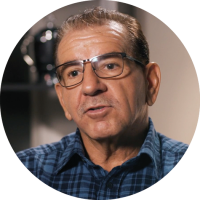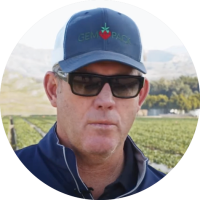
Let’s talk about Magnificent Microbiomes and why they are the best real estate to invest in!
Microorganisms (also called microbes, including bacteria, fungi, viruses, archaea, etc.) are everywhere. Typically invisible to the naked eye, they live in and on plants, animals, water, soil, food and humans. Within each of those habitats, microorganisms form communities called ‘microbiomes.’
Microbiomes have many essential functions in the environments they live in, and are so important to maintain the balance and health of their environment. For example, trillions of microorganisms live in and on our body (skin, mouth, lungs, intestines, etc.) where they actively help protect us from infections by fighting off bad bacteria, among other things. They also help us digest food, and produce vitamins and hormones that are essential for our health.
Microbiomes can also be found in the soil, where they help plants to grow. They do this by fixing nitrogen in the soil and converting it into a form that plants can use for growth. Together microbiomes are actively contributing to clean environments, sustaining food systems, mitigating climate change and keeping people healthy.
It may be hard to envision what a microbiome looks like, so a Harvard study provided this unique metaphor: “Picture a bustling city on a weekday morning, the sidewalks flooded with people rushing to get to work or to appointments. Now imagine this at a microscopic level and you have an idea of what the microbiome looks like inside our bodies, consisting of trillions of microorganisms of thousands of different species.” (Source https://www.hsph.harvard.edu/nutritionsource/microbiome/)
The microbiome is often labeled a supporting organ because it plays so many key roles in promoting the smooth daily operations of the human body. Each person has an entirely unique network of microbiota that is originally determined by one’s DNA. A person is first exposed to microorganisms as an infant, during delivery in the birth canal and through the mother’s breast milk. Later on, environmental exposures and diet can change one’s microbiome to be either beneficial to health or place one at greater risk for disease.
The microbiome consists of microbes that are both helpful and potentially harmful. Most are symbiotic (where both the human body and microbiota benefit) and some, in smaller numbers, are pathogenic (promoting disease). In a healthy body, pathogenic and symbiotic microbiota coexist without problems. But if there is a disturbance in that balance—brought on by infectious illnesses, certain diets, or the prolonged use of antibiotics or other bacteria-destroying medications—dysbiosis occurs, stopping these normal interactions. As a result, the body may become more susceptible to disease.
Now that we are up-to-date on what the microbiome is, and how a healthy gut microbiome benefits the body, let’s talk about the impact of environmental chemicals on the gut microbiome. Since the surge of microbiome research in the last decade, many studies have provided insight into the causes and consequences of changes in the gut microbiota.
Among the multiple factors involved in regulating the microbiome, exogenous factors such as diet and environmental chemicals have been shown to alter the gut microbiome significantly.
Although diet substantially contributes to changes in the gut microbiome, environmental chemicals are major contaminants in our food and are often overlooked.
Major classes of environmental chemicals (bisphenols, phthalates, persistent organic pollutants, heavy metals, and pesticides) impact the gut microbiome, which includes alterations in microbial composition, gene expression, function, and health effects in the host. Health-related implications of gut microbial changes can include changes in metabolism, immunity, and neurological function.
HEAVY METALS AND THE GUT MICROBIOME
Heavy metals are natural, high-density elements found in the Earth’s crust and are highly toxic even at low concentrations. Several studies have examined the impact of heavy metals, such as lead, cadmium, arsenic, and mercury on the gut microbiome, which have reduced diversity of gut microbiota and altered the metabolism of many pathways, including vitamin E, bile acid, and nitrogen metabolism.
PESTICIDES AND THE GUT MICROBIOME
Pesticides, which include insecticides, herbicides, and fungicides, are used globally to aid in food production. Although pesticides are generally highly toxic to target species through mechanisms that may not initially affect humans, many pesticides ARE toxic to humans and wildlife through other mechanisms, including endocrine disruption. Recent studies on environmentally relevant doses of pesticides have revealed the long-term consequences of the environmental metabolites of legacy pesticides as well as the harms of their replacements, especially on organ systems including the gut. Studies in adults across multiple species using a wide range of insecticides, fungicides, and herbicides show alterations of the gut microbiome as well as other common effects, including altered lipid metabolism, inflammation, and oxidative stress.
Collectively, the existing data suggest that exposure to environmental chemicals like heavy metals and pesticides during various stages of life causes alterations in the gut microbiome and is associated with changes in health, including immune dysfunction, altered carbohydrate and lipid metabolism, and neurobehavioral impairments.
Celebrate World Microbiome Day! June 27th is World Microbiome Day! On this day we celebrate all things microbial, and organizers strive to share how important microbes are for the health of humans, animals, plants, oceans, and the entire planet. However, the importance of World Microbiome Day doesn’t just end on June 27th. The mission is a bottom-up movement that aims to educate and empower everyone with knowledge of the microbiome. The goal is to introduce international microbiome researchers and microbiome‐literate professionals to the public to raise awareness of the vibrant and diverse world of microbes and we invite the public and industry professionals to share their thoughts and activities with the microbiome community.











